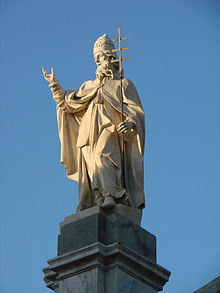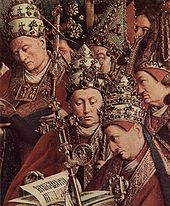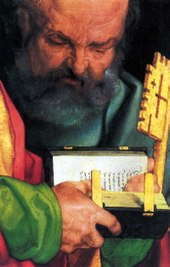Pope
![]()
This article is about the office of leadership of the Roman Catholic Church. For other meanings, see Pope (disambiguation).
Pope (from Ancient Greek πάππα, filial address Papa; Church Latin papa; Middle High German babes[t], New High German Babst) is the German-language spiritual title for the Bishop of Rome as head of the Roman Catholic Church. Other titles include Holy Father and Pontifex Maximus.
The incumbent Jorge Mario Cardinal Bergoglio SJ, with the papal name Francis, was elected the 266th pope in conclave on 13 March 2013. His predecessor Benedict XVI has been referred to as Papa emeritus (Pope Emeritus) since his retirement from office.
The office of the Pope, the episcopal see of the diocese of Rome, is known as the Holy See. It is a non-state subject of international law and represents the Vatican City State and the Roman Catholic Church in international relations. Under the Basic Law of the Vatican City State, the Pope also has plenary legislative, executive, and judicial powers as head of the Vatican City State. He can act in international law on behalf of the Holy See and the Vatican City State, although the latter is rare.
The cathedral church of the diocese of Rome and thus the bishop's seat of the Pope is the Lateran Basilica. The residence of the Pope since 1871 is the Apostolic Palace.

Depiction of St. Silvester (314-335 Bishop of Rome) with Papal Cross in Pisa by Giovanni Antonio Cybei
History
→ Main articles: History of the papacy, Avignonesian papacy and Occidental schism.
According to the doctrine of the Roman Catholic Church and the churches united with it, the current pope is the successor of the apostle Peter, who, according to tradition, suffered martyrdom in Rome around the year 67. According to tradition, Peter was the first bishop of Rome. The Second Vatican Council's dogmatic constitution on the Church, Lumen Gentium, refers to the pope as "the perennial and visible principle and foundation for the unity of the multiplicity both of bishops and of the faithful." The claim of Peter and his successor to leadership authority is derived from several biblical passages, especially the "rock word" Mt 16:18 EU and the "key word" Mt 16:18 EU, also from Lk 22:32 EU ("strengthen your brothers") and Jn 21:15 ff. EU ("feed my lambs").
It is disputed whether the first letter of Clement from the year 98 - according to some from the year 69 - already documents a priority position of the church of Rome or is to be seen as a fraternal exhortation among equals. In this letter to the church of Corinth, the church of Rome demands that the Corinthians take back deposed presbyters. The letter refers to the martyrdom of the apostles Peter and Paul in Rome.
In the Roman Catholic Church, the first known association of the designation papa with the bishop of Rome dates only from the time of Marcellinus († 304), who is so designated in the funerary inscription of Deacon Severus. Bishop Siricius (tenure 385-399) was the first to bear the proper designation papa. As the exclusive official designation for the bishop of Rome, the term is legally established by Gregory I from 590 to 604.
From the 2nd century at the latest, Papa was generally an honorary title for Christian dignitaries in the Greek Orient. The head of the Coptic Church, which since the Council of Chalcedon in 451 is no longer in communion with the Greek or Latin Church, also bore the title Papa since Heraclas (232-248) at the latest; in German usually rendered as Pope or Patriarch of Alexandria.
Since the tenure of Leo I (440-461), the Roman pope has held the title Pontifex Maximus, which had been used in Roman administration since the 5th century BC and was later held by the Emperor of the Roman Empire as the chief priest of the Roman religions until Emperor Gratian. Etymologies for the term "pontifex" include "bridge-builder" or "path-builder".
In the Middle Ages there were repeatedly several popes at the same time, because during the lifetime of an already canonically elected pope a counter-pope was raised. Causes were that the College of Cardinals split and emperors or urban Roman noble families intervened in the election of the pope. Also, exclusivism was a way for Catholic monarchs to interfere in the election of the pope. Such interference has been forbidden under threat of excommunication since Pius X. Before the 13th century, the pope resided in the Lateran. In the 15th century, conciliarism gained momentum, granting councils higher authority than papal decisions, but was soon pushed back.
See also: List of Coptic Popes

Popes at the Adoration of the Lamb (partial view of the Ghent Altarpiece by Jan van Eyck)

Peter, partial view of the painting The Four Apostles by Albrecht Dürer
Title
According to the Annuario Pontificio, the yearbook of the Holy See, the Pope's titles are as follows:
- Episcopus Romanus, Bishop of Rome
- Vicarius Iesu Christi, Vicar of Jesus Christ. This title, already documented in the 5th century, originally also refers to bishops and priests. The dogmatic Constitution Lumen Gentium of the Second Vatican Council refers to this title both to the Pope with regard to the universal Church (LG 18,2) and to the individual bishop with regard to the particular Church entrusted to him (LG 27,1). The Codex Iuris Canonici uses the title exclusively for the Pope.
- Successor Principis Apostolorum, successor of the Prince of the Apostles (Peter). This title refers to the spiritual foundations of the papal office, insofar as Peter was both the first in the College of the Apostles and the first Bishop of Rome.
- Summus Pontifex Ecclesiae Universalis, "supreme bridge builder of the universal Church". This title expresses the claim to the highest authority within the whole Church on earth. From there derives the Pope's position in the liturgy, such as concelebration with patriarchs.
- Primas Italiae, "Primate of Italy". This is a purely honorary title. The power of a primate is exercised by the pope by virtue of the papal primacy.
- Archiepiscopus et Metropolitanus Provinciae Romanae, Archbishop and Metropolitan of the Ecclesiastical Province of Rome. Like all metropolitan bishops, he exercises certain rights of supervision and control over his suffragan bishops.
- Sovereign of the State of the Vatican City. This is the title of the Pope under international law-worldly.
- Servus Servorum Dei, "Servant of the Servants of God". This title was first given to Pope Gregory the Great, subsequent popes have continued this.
The title Patriarch of the Occident (Patriarcha Occidentis) or Patriarch of the West was adopted by the popes after the Council of Chalcedon in 451 and held for 1500 years. The Patriarchate of the Occident was the only one of the five early church patriarchates that was located in the Western Roman Empire. The Latin Church developed from it. Pope Benedict XVI resigned the title after his election as pope, so it was removed from the official papal titulary in the Annuario Pontificio of 2006. Regardless of the title of patriarch, the pope is considered by some canonists to be the patriarch of the Western Church, from which his powers and jurisdiction in the Latin Church derive.
In addition to this official title, the pope is also known as Pontifex Maximus (often abbreviated in inscriptions as P. M. or Pont. Max.) or Episcopus Ecclesiae Catholicae ("Bishop of the Catholic Church").

Documents are usually signed by the pope with his papal name, the actual (usually Latinized) name being directly followed by the abbreviation PP. (for "papa") follows directly the actual (usually Latinized) name, with the ordinal number appended if necessary: "Ioannes Paulus PP. II.", "Benedictus PP. XVI." and "Franciscus PP.".
Salutation
Catholics usually use Holy Father to address the Pope. The diplomatic protocol corresponds to the designation or address of the Pope as Holiness or as Holy Father.
Questions and Answers
Q: Who is the current Pope?
A: The current Pope is Pope Francis.
Q: How are Popes elected?
A: Popes are elected by Cardinals of the Catholic Church.
Q: What happens when a new Pope is elected?
A: When a new Pope is elected, they choose a regnal name and everyone is told this new name when the Habemus Papam is read out.
Q: What does the title "Pope" mean?
A: The title "Pope" comes from the Greek word pappas meaning "father".
Q: Is it common for Popes to resign?
A: No, it is not common for Popes to resign; in fact, Pope Benedict XVI was the only one to do so in the last 500 years.
Q: Are there any special powers associated with being a Pope?
A: Catholics believe that when making statements ex cathedra (official statements teaching about faith and morals), the Pope has infallibility - which means God will not allow his followers to be misled by allowing their leader to make a wrong statement. Only two of any Pope's statements have been ex cathedra.
Q: What activities do modern day Popes usually engage in? A: Modern day Popes usually travel around many countries around the world preaching and leading both church and government activities.
Search within the encyclopedia